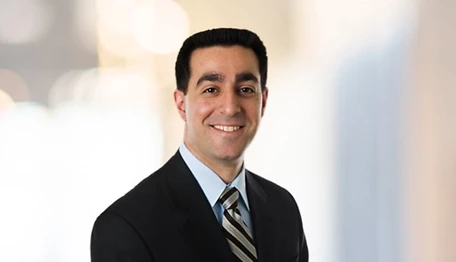OVERVIEW
While trial attorneys properly focus on winning the trial, appellate attorneys focus on the larger goal of winning the case. The Appellate Group provides exceptional written and oral advocacy at every level of litigation. In addition to its traditional function of handling appeals, the group serves our clients by becoming involved in their most difficult and complex cases at the early stages of litigation. The group routinely provides assistance with developing litigation strategy, drafting dispositive motions, monitoring trials, and crafting post-trial motions. The group enjoys a well-earned reputation for creative, nuanced, and thorough legal analysis, and is frequently at the forefront of developing areas of the law.
Pre-Trial, Post-Trial and Appellate Advocacy
We provide appellate-level experience at all levels of litigation, including:
- Counseling: We assist in the development of litigation strategy to position issues for appeal or, in some cases, avoid an appeal altogether.
- Motions Practice: Our attorneys identify and develop the important legal issues through pre-trial motions, trial briefs, oral argument, and interlocutory appeals.
- Trial Monitoring: We monitor the trial to ensure preservation of the record, identify trial court errors, prepare trial briefs, and, if necessary, facilitate settlement.
- Post-Trial Intervention: At the critical post-trial stage where the appellate issues are identified and developed, our attorneys provide a fresh perspective of the record and an objective evaluation of the chances of success through the post-trial motion and appeal.
- Appeals: Our attorneys craft creative and persuasive appellate arguments, drawing upon our nuanced understanding of the appellate rules and thorough knowledge of the record in each case. Our expertise in appellate practice and procedure often provides us a strategic advantage over our opponents.
Appellate practice is not just a procedural specialty
Our appellate lawyers undertake these roles in the broad spectrum of substantive areas of the law and jurisdictions in which the firm practices generally. We routinely handle cases in areas of law such as catastrophic/excess liability; ERISA; class actions; construction practices; general commercial litigation; insurance coverage and bad faith; insurance fraud; insurance professional liability; life health and disability; medical professional liability; product liability; subrogation; and toxic and environmental torts. This extensive multi-disciplinary experience provides a unique perspective and contributes to an informed analysis of legal issues for our clients.
We add value to the representation of our clients
Our singular focus is to achieve the best possible result for our clients using our procedural and substantive expertise. We endeavor to do this in a cost-effective manner that is collaborative - and not duplicative - of the efforts of litigation counsel. Thus, the decision to add one of our appellate lawyers to an existing trial team or to hire one of our appellate lawyers to handle or collaborate upon a post-trial motion or appeal is an investment in a favorable outcome.
The Appellate Group achieves successful results for our clients. These results are as varied as securing the reversal of one of the largest judgments in Pennsylvania history to obtaining an extraordinary emergent stay from the state supreme court during trial that resulted not only in the stay of the subject trial, but hundreds more until an unsettled venue issue was resolved by the Supreme Court.
Explore
Representative Matters
- Construction Accidents: Visconti v. Harmon Cove IV Condo. Ass’n, 2022 N.J. Super. Unpub. LEXIS 2185 (N.J. Super. App. Div. Nov. 18, 2022)
An injured employee of a pool contractor sued a condominium association and management company for injuries suffered while on-site at a condominium pool. The third-party plaintiffs, the condominium association and its management company, successfully moved for summary judgment against the third-party defendant, the pool contractor. The trial court found that the insurance obtained by the pool contractor did not meet the coverage requirements contained in the applicable service agreement between the association and the pool contractor. The trial court also found that under the facts presented to it, the pool contractor had to be partially negligent and, therefore, had a duty to indemnify the third-party plaintiffs under the service agreement. The Appellate Practice Group was retained to pursue an interlocutory appeal, and promptly secured a reversal on appeal. The New Jersey Appellate Division concluded on the breach-of-contract claim that summary judgment was premature given the pendency of a related declaratory judgment action. On the indemnity claim, the Court concluded that disputed issues of fact concerning all parties’ liability for the accident precluded summary judgment.
- Employment: Rourke v. Herr Foods Inc., 2022 N.J. Super. Unpub. LEXIS 1970 (N.J. Super. App. Div. October 26, 2022).
This appeal addressed the enforceability of an arbitration agreement in the context of claims sounding in sex discrimination. The plaintiff signed two Mutual Arbitration Agreements during his period of employment with the employer. Pursuant to the agreements, all disputes between the plaintiff and the employer were to be resolved in arbitration pursuant to the Federal Arbitration Act (“FAA”). The employer ultimately terminated the plaintiff’s employment, and the plaintiff filed suit alleging various causes of action and violations of New Jersey’s Law Against Discrimination (“NJLAD”). On behalf of the employer, we moved for arbitration, and the trial court concluded the Mutual Arbitration Agreement was enforceable and, accordingly, stayed the proceedings and ordered the parties to participate in mandatory binding arbitration. The plaintiff argued on appeal that amendments to the NJLAD and FAA voided the arbitration agreement with respect to claims of sex discrimination, and enforcing such an agreement would violate the New Jersey Constitution. The Appellate Practice Group successfully argued that the plaintiff’s construction of the FAA, NJLAD, and their respective legislative amendments, as well as his constitutional and policy-based arguments did not entitle the plaintiff to renege on the terms of the agreement. As a result, the Appellate Division affirmed the trial court’s order and held that the plaintiff must arbitrate his claims.
- Class Actions: Moyer v. Patenaude & Felix, A.P.C., 2021 U.S. App. LEXIS 7566 (3d Cir. Mar. 16, 2021)
A debtor filed a putative class action against a California law firm alleging that a letter she received was deceptive because it invited her to call if she wanted to “eliminate further collection action” and because the letter could cause a debtor to forgo her rights to have the debt collector validate the debt and stop collection activities, because to trigger those rights the debtor must make a written request. On appeal to the Third Circuit, the court agreed that the letter was not deceptive and complied with all requirements of the Fair Debt Collection Practices Act. The court noted that the debt collector included the statutorily required language informing the debtor of her rights under the FDCPA and how to claim those rights. Furthermore, the court found that the debt collector never asserted that a phone call would legally require the debt collector to stop its collection efforts. The court also rejected the debtor’s contention that the inclusion of the invitation to call immediately before the legally mandated validation notice overshadowed her validation rights because it was unclear whether she could exercise her validation rights by writing or by phone call. The court’s decision provides much needed clarification to the district courts in this circuit that had reached inconsistent opinions on the propriety of an invitation to a debtor to call the debt collector.
-
Commercial Litigation: Marion v. Bryn Mawr Trust Co., --- A.3d ---, 2021 Pa.Super. LEXIS 60 (Pa. Super. Feb. 16, 2021)
In this case, a court-appointed receiver sought to recoup money lost in a Ponzi scheme from a bank that should have known that the fraud’s perpetrator used the bank to perpetuate the scheme. At trial, the bank successfully argued that if the receiver did not redeem some CDs prior to their maturity and engage in an expensive litigation strategy to recoup losses, the victims would have been fully compensated for their losses. On appeal, the Superior Court of Pennsylvania ordered a new trial. It held that the trial court abused its discretion by admitting evidence of the receiver’s strategy to recoup the victims’ losses. Specifically, it held that the receiver’s early liquidation of CDs was reasonable and therefore did not demonstrate a failure to mitigate damages. It also held that evidence of incurred attorneys’ fees were irrelevant to whether the bank was liable to the victims. Finally, the Superior Court held that Pennsylvania recognizes a claim for aiding and abetting fraud. As such, the Superior Court reinstated that claim, which was dismissed prior to trial. On retrial, the defendant bank faces exposure of over $20 million.
- Insurance Coverage and Bad Faith: Port Consol., Inc. v. Int'l Ins. Co. of Hannover, PLC, 826 F. App'x 822 (11th Cir. Sep. 8, 2020)
This case involved an insurance claim for a series of allegedly coordinated fuel thefts from the insured’s commercial cardlock fuel facility due to a programming error with the pumps. The primary issue before the court was whether the series of thefts constituted separate, individual “occurrences” under the policy, or whether they were collectively a single occurrence. The Eleventh Circuit affirmed the district court and agreed that the term “occurrence” under Florida law is defined by the “immediate injury-producing act,” and none of the occurrences involving the alleged fuel thefts exceeded the policy’s $1,000 deductible required for coverage. The court also affirmed the dismissal of the insured’s request for attorney’s fees under a specific Florida statute allowing an insured to recover fees when they obtain any award against an insurer.
- Healthcare: Repko v. Our Lady of Lourdes Med. Ctr., Inc., 464 N.J. Super. 570 (App. Div. 2020)
This case created new law in New Jersey as an issue of first impression. A lawsuit was filed on behalf of a plaintiff who, unbeknownst to counsel, passed away before the complaint was filed. Our litigation team uncovered this fact and moved to dismiss the complaint since a deceased plaintiff does not have standing to file a lawsuit. The trial court, however, permitted the plaintiff to amend the complaint to identify the decedent’s estate as the plaintiff. The Superior Court of New Jersey, Appellate Division, reversed and held that a deceased plaintiff lacks standing to bring a complaint and, therefore, the complaint had no legal effect. As such, the complaint could not be amended and the case was dismissed on appeal.
- Healthcare: Ryle v. Fuh, 820 F. App’x. 121 (3d Cir. Jul. 13, 2020).
This case involved an Eighth Amendment cruel and unusual punishment claim made by a prison inmate against prison healthcare staff. The prisoner claimed that the healthcare providers violated his civil rights by failing to provide him with adequate medical treatment related to a hand injury. The Third Circuit held that since the providers attempted to render care to the prisoner, they were not deliberately indifferent to his serious medical needs and thus did not violate his civil rights. In addition, the court held that the policy of requiring paperwork to be submitted by prisoners as a prerequisite to receiving care did not cause any constitutional violation.
- Real Estate: Allegheny Defense Project v. Fed. Energy Regulatory Comm’n, 964 F.3d 1 (D.C. Cir. 2020)
A team of White and Williams commercial litigators and appellate lawyers succeeded in convincing an en banc panel of the District of Columbia Circuit to overturn 50 years of precedent and rule that the Federal Energy Regulatory Commission (FERC) violated the Natural Gas Act (NGA) by tolling rehearing requests related to pipeline and other gas projects. Pennsylvania landowners led a group of Pennsylvania property owners challenging FERC’s long-standing routine issuance of tolling orders to extend the 30-day deadline in the NGA for FERC to act on rehearing requests opposing pipeline construction. After its initial request was denied, our lawyers petitioned for a rehearing, explaining that it took FERC nine months to deny the rehearing request, during which time homeowners’ property was seized via eminent domain and construction began on the pipeline – a circumstance which had become increasingly common. The circuit judges granted en banc rehearing. Circuit Judge Patricia A. Millett signaled that the case had potential to spark change to the standard, commenting that FERC “has twisted our precedent into a Kafkaesque regime” that keeps property owners in “administrative limbo” while their land is developed. On en banc rehearing, the D.C. Circuit ruled in our clients’ favor, finding that the tolling orders our clients (and every other petitioner for the last 50 years) were subject to violated the NGA and could no longer be used by FERC. The court’s opinion relied heavily on our arguments as to why recent amendments to the Federal Power Act demonstrate that FERC’s use of tolling orders under the NGA, which is read in pari materia with the Federal Power Act, could no longer be upheld. The court noted that FERC tolled all landowner rehearing requests in pipeline cases over the past 12 years. The decision represented a significant victory for landowners, future homeowners, and environmental groups who have legitimate claims that proposed pipelines are not necessary for public use and/or that their harms outweigh the benefits. This high-profile matter received attention from Congress, the energy sector, civil rights groups and environmental organizations, and was also notable because the en banc hearing was the first ever to be held telephonically.
- Insurance Coverage and Bad Faith: Northrop Grumman Corp. v. Axis Reinsurance Co., 809 F. App'x 80 (3d Cir. Apr. 22, 2020)
Northrop Grumman was a defendant in two ERISA class actions, one brought in 2006 and the second in 2016, and sought coverage from National Union and AXIS Reinsurance. Both carriers denied defense and indemnity, and Northrop filed a coverage action. The central issue was whether the 2016 class action was “related” to the 2006 action pursuant to the terms of the National Union policy. If it was, AXIS would have to fund the defense and settlement of that action because the underlying policies (including one issued by National Union) were exhausted. If the two actions were not related, National Union would have to provide coverage under its 2016 primary policy. The Third Circuit affirmed the district’s court’s grant of summary judgment in favor of National Union, which concluded that the 2016 action was related to the 2006 action, implicating AXIS’ policy. Significantly, the Third Circuit’s opinion opens and closes by reiterating the theme that we put forth at oral argument – that the two actions are “related” under the applicable legal standard just as family siblings and cousins are related – they may not be identical in every respect, but they substantially overlap in many respects and are part of the same family, which is why they were “related.”
- Insurance Coverage and Bad Faith: Powell v. AmGuard Ins. Co., 2020 Del Super. LEXIS 109 (Del. Super. Ct. Mar. 2, 2020)
This matter involved a Delaware workers’ compensation claim in which the injured worker’s estate sued the workers’ compensation carrier for a 2 ½ month delay in issuing workers’ compensation payments. The delayed payments totaled $7,300, which the insurer ultimately paid. The plaintiff’s attorney made repeated inflammatory statements in his closing argument that were unsupported by the evidence. The jury found the delay unreasonable, returned a verdict for the plaintiff, and awarded $500,000 in punitive damages – a 17,000 to 1 ratio between punitive and compensatory damages. Our lawyers were retained after the verdict. On our motion for post-trial relief, the court agreed that the evidence supported no more than “recklessness,” ratios far less than 17,000 to 1 have been found excessive, and even if the plaintiff never received the $7,300 owed, the potential harm to punitive damages ratio was still grossly disproportionate. The court also agreed that the more apt benchmark for punitive damages was a civil penalty for an employer’s failure to pay wages, which would suggest a penalty of no more than $7,300 in this case. Applying the constitutional guideposts to the evidence, the court found that the punitive damages award was excessive to the point that it shocked the court’s conscience and sense of justice. The court awarded a new trial on both liability and damages since the court concluded that the plaintiff’s attorney’s closing argument indelibly tainted the entire proceeding.
- Life, Health and Disability: Lomma v. Ohio Nat’l Life Assur. Corp., 788 F. App’x 104 (3d Cir. Oct. 8, 2019)
The court addressed a breach-of-contract claim based on an insurance carrier’s denial of death benefits under a suicide exclusion in a life insurance policy. The district court found that there was coverage, and on appeal, the Third Circuit reversed. The court rejected the beneficiaries’ claim that this provision was ambiguous, finding that the language of the suicide exclusion unambiguously limited coverage to premiums paid where the insured commits suicide within the first two years of the policy.
- Healthcare: Ass’n of NJ Chiropractors v. Horizon Healthcare Servs., 2019 N.J. Super. Unpub. LEXIS 1280 (App. Div. Jun. 5, 2019)
A trade association and a chiropractor sued our client on claims that that our client’s tiering decision in its OMNIA healthcare plan violated the state Healthcare Quality Act, N.J.S.A. § 17B:27-51.1 and that the state’s opioid crises required the court to create a private right of action to challenge Horizon’s tiering decisions. The Superior Court of New Jersey, Appellate Division affirmed the trial court’s dismissal of the suit, finding that none of the cited statutes or regulations created a private a right of action because the laws were intended to protect consumers, not chiropractors. The court also found that the plaintiffs’ argument concerning New Jersey’s opioid crises was waived because it was presented for the first time on appeal.
- Healthcare: Gilmore v. Holland, 2018 U.S. Dist. LEXIS 32750 (PA. Super. Dec. 12, 2018)
The plaintiff experienced an emergency after he was admitted to a hospital for elective surgery. The plaintiff alleged that the medical providers’ failure to stabilize his emergency condition raised a viable claim under the Emergency Medical Treatment and Active Labor Act (“EMTALA”). EMTALA was passed not as a federal medical malpractice statute, but as an attempt to prevent hospitals from refusing to treat and stabilize individuals who lack adequate insurance. EMTALA therefore only covers individuals who come to the hospital seeking treatment for an emergency condition. Since the plaintiff was already a patient when his emergency arose, the district court concluded that he was not entitled to EMTALA’s protections, and dismissed his federal case. On appeal to the Third Circuit, the court affirmed the dismissal.
- General Commercial Litigation/Food and Beverage: Leonetti's Frozen Foods, Inc. v. Crew, Inc., 887 F.3d 438 (8th Cir. 2018)
Leonetti’s, a Philadelphia-based specialty food manufacturer, filed suit against its former broker, Crew, on grounds that Crew’s false email to Leonetti’s prospective customer, Sam’s Club, caused Leonetti’s to lose a once-in-a-lifetime, multi-million-dollar business opportunity. Specifically, Crew’s principal sent a ‘reply all’ email suggesting that Leonetti’s could use slides concerning a proprietary stromboli it developed for Sam’s Club in an upcoming sales pitch to Costco, Sam’s Club’s number-one competitor. Crew initially prevailed on summary judgment in the United States District Court for the Western District of Arkansas on grounds that Leonetti’s failed to adduce evidence showing that the email proximately caused it to lose its opportunity with Sam’s Club. Leonetti’s appealed to the Eighth Circuit, which reversed the District Court upon concluding that it improperly weighed and credited evidence presented by Crew while failing to consider circumstantial evidence of causation proffered by Leonetti’s. After receiving the reversal decision, Leonetti’s policy-limits demand was accepted by Crew resulting in a seven-figure settlement.
- Products Liability/Toxic Torts: Town of Westport v. Monsanto Company, 877 F.3d 58 (1st Cir. 2017)
In a landmark decision that defines the plaintiff’s burden of proof in chemical contamination cases, the First Circuit rejected claims in excess of $23 million for the remediation of polychlorinated biphenyls (PCBs) from a Massachusetts public school. At the time of the school’s construction in 1969, PCBs were lawfully used in building products such as caulk. After detecting PCBs in the school during renovations four decades later, the Town of Westport brought suit against Monsanto Company (now Pharmacia Corporation) seeking recovery for property damage under Massachusetts law. On appeal, the First Circuit held Westport to the burden of proving that, at the time of construction of the school in 1969, it was reasonably foreseeable that PCBs would volatilize (off-gas) at levels harmful to human health. Because the plaintiff’s own experts conceded that there are no studies, even today, that purport to demonstrate that PCBs volatilize at levels capable of causing human disease, the Court concluded that the plaintiff failed to establish any viable products liability cause of action.
- Healthcare: James v. Albert Einstein Med. Ctr., 2017 Pa. Super. LEXIS 697 (Pa. Super. Sep. 12, 2017)
In this medical malpractice case commenced by a decedent’s estate, the mother of the deceased was properly precluded from testifying about her pain and suffering from the loss of her son. The court held that although the decedent’s mother was a potential beneficiary under Pennsylvania’s Wrongful Death Statute, she was not entitled to damages for the loss of consortium with regard to her son because it is well settled that Pennsylvania does not recognize a right of filial consortium. As such, the mother was properly precluded from testifying about her pain and suffering.
- Catastrophic/Excess Liability: Wilson v. U.S. Security Assocs., Inc., 2017 Pa. Super LEXIS 537 (Pa. Super. July 18, 2017)
The case concerned alleged inadequate security and related claims arising from the murder of two Kraft Foods employees, and non-fatal injuries inflicted on a third employee, by a disgruntled former co-worker. Following a substantial adverse jury verdict of $46.5 million (of which $38.5 million was punitive damages) against the security company, we pressed on appeal numerous challenges to the punitive damages award. The plaintiffs sought to add a punitive damages claim in the middle of trial that was previously dismissed without prejudice. On appeal, the court held that the plaintiffs could not do so because the statute of limitations had run, and thereby entered judgment notwithstanding the verdict on the plaintiffs’ $38.5 million punitive damages award. In so ruling, the court rejected the argument that a punitive damages claim was merely an extension of the underlying claims.
- Healthcare/Civil Rights: Billups v. Penn State Milton S. Hershey Medical Center, 2017 U.S. Dist. LEXIS 163473 (M.D. Pa. Sept. 29, 2017), aff'd, 2018 U.S. App. LEXIS 25800 (3d Cir. Sept. 12, 2018)
The Third Circuit rejected a non-actionable civil rights claim brought against physicians for an alleged misdiagnosis of child abuse. The lawsuit arose after a local hospital made a report of suspected child abuse when an infant patient was found to have sustained serious, unexplained, physical injuries, while alone in her father’s care. After transfer of the infant to a major trauma center, the defendant-physicians performed medical testing to investigate the cause of the infant’s injuries and issued a finding of non-accidental trauma. The infant’s father was charged with child abuse; however, he ultimately obtained an acquittal by hiring experts who opined that the child’s injuries could be explained by rare medical conditions that “mimic” physical abuse. The infant’s parents then brought suit against three physicians involved in the testing, asserting various purported civil rights violations. At the pleadings stage, the District Court refused to find that a substantive due process claim is sufficiently stated where medical professionals determine that abuse occurred, but subsequent investigations indicate that abuse may not have occurred. The District Court, however, permitted the parents to pursue a claim for alleged misrepresentation of the testing performed to rule out non-traumatic causes. After discovery revealed the accuracy of the physicians’ statements, and no evidence of any deliberate indifference to the possibility that the child had not been abused, the District Court granted summary judgment in favor of the defendant-physicians. The Third Circuit unanimously affirmed, recognizing that the plaintiff-parents were impermissibly attempting to cast a non-actionable claim of alleged misdiagnosis into a misrepresentation claim.
- Healthcare/Civil Rights: Ferris v. Milton S. Hersey Med. Ctr., 2016 U.S. Dist. LEXIS 133927 (M.D. Pa. 2016) aff’d 2017 U.S. App. LEXIS 12448 (3d Cir. July 12, 2017)
Parents of a newborn born prematurely and near death in an ambulance refused to consent to certain medical treatments and refused to cooperate with medical providers attempting to provide care. Faced with an impending deadline to administer certain treatments, the medical providers made a report of suspected child neglect to social services which ultimately resulted in the police taking custody of the infant to allow for the necessary medical treatment to be administered. Plaintiffs promptly sued the medical providers, asserting various civil rights violations. After five years of litigation, we moved for summary judgment on behalf of the medical providers. The district court held that emergency circumstances justified the medical providers’ report to social services and granted our motion, and the Third Circuit affirmed.
- Healthcare: George v. Connections Community Support Programs, Inc., No. 188, 2017 (Del. Jul. 12, 2017)
A prisoner sought an extraordinary writ of mandamus from a court to compel a medical care contractor for Delaware’s prisons to provide medical care to the prisoner. The Delaware Supreme Court agreed with our position that such a writ was unavailable because the requested medical care was a discretionary act and the medical care contractor did not qualify as an administrative agency.
- Product Liability: Walls v. Ford Motor Co., 160 A.3d 1135 (Del. Apr. 21, 2017)
The plaintiff claimed that the automotive manufacturer was negligent in failing to warn the deceased of the dangers posed by the use of its asbestos-containing products, as well as the use of asbestos-containing products manufactured by other companies, which were later installed on its vehicles. Prior to trial, the trial court granted the automotive manufacturer’s partial summary judgment, holding that a manufacturer does not have a duty to warn about products manufactured by other companies. On appeal to the Delaware Supreme Court, the court affirmed the trial court’s ruling, finding no need to decide whether the application of the “bare metal” defense was appropriate since the ruling was harmless in light of the jury’s finding that the automotive manufacturer was not negligent for failing to warn about the dangers associated with the use of its own original and replacement component parts. The Court found that the automotive manufacturer had no duty to warn about its own asbestos-containing parts. As a result, there was also no duty to warn about the alleged danger associated with asbestos-containing parts manufactured by third parties.
- Employment Law: Beckwith v. The Pennsylvania State University, 2016 U.S. App. LEXIS 21402 (November 30, 2016)
A former University medical professor alleged that the University breached her employment agreement and violated her right to procedural and substantive due process when it terminated her employment after a little more than two years. The trial court granted the University’s request for summary judgment and dismissed the professor’s claims. The United States Court of Appeals for the Third Circuit agreed. The Court found that the University provided the professor with all the process she was due. In so finding, it noted that after the initial termination notice, the professor was provided multiple and meaningful chances to voice her objections. The Third Circuit also rejected the professor’s breach of contract claim. The Court reasoned that the professor was offered a tenure-eligible position, and that the University’s policies – which were incorporated by reference into her contract – permitted the University to terminate a tenure-eligible position prior to the conclusion of the six-year process for acquiring tenure.
- Class Actions: Ensey v. GEICO, 2016 U.S. App. LEXIS 19562 (3d Cir. Oct. 31, 2016)
A GEICO policyholder was injured in an automobile accident. After she exhausted her uninsured/underinsured (UM/UIM) coverage, she filed suit against GEICO arguing that she was entitled to reform her UM/UIM coverage to match her bodily injury (BI) limits. The case also sought reformation of non-matching UM/UIM coverage for all other similarly situated GEICO policyholders. The plaintiff asserted numerous claims against GEICO. The district court dismissed all claims and agreed with our position that the plaintiff was wrong under the law about her alleged entitlement to UM/UIM limits that matched her BI limits. Thus, she was not entitled to reform her policy under any legal theory. The Third Circuit affirmed, largely adopting our reasoning.
- Insurance Coverage and Bad Faith: Bowerman v. National Life Ins. Co., 2016 U.S. App. LEXIS 12503 (3d Cir. July 7, 2016)
Decades ago, the plaintiff chiropractor began collecting disability benefits after he injured his shoulder in a biking accident. Due to the accident, he had to curtail his chiropractic practice. He supplemented his curtailed practice by working full or nearly full-time as a director at a health insurer. Prior to age 55, his policy provided benefits when he could not perform his occupation at the time the disability began. After age 55, benefits were available when he could not perform an occupation for which he is or becomes reasonably fitted by training, education or experience. The district court agreed that the plaintiff’s work as a director at a health insurer fell within the latter definition of occupation, and the Third Circuit affirmed.
- Catastrophic/Excess Liability: Williams v. Trugreen Ltd. Partnership, Pa. Supr. Ct. No. 61 EM 2016
A driver of a commercial vehicle was injured in a crash and suffered quadriplegia. On the eve of a major jury trial, on behalf of one of numerous defendants, we obtained an emergency stay of the trial from Pennsylvania Supreme Court because the Fair Share Act requires all co-defendants be tried at one time. At the time of trial, another co-defendant’s appeal was pending of a denial of summary judgment concerning immunity. After further consideration, the Pennsylvania Supreme Court later vacated the stay and allowed the trial to proceed.
- Construction Accidents: Nertavich v. PPL Electric Utils., 100 A.3d 221 (Pa. Super. 2014), aff’d, 124 A.3d 734 (Pa. 2015) (per curiam)
An employee of a painting subcontractor fell from an electric transmission pole while painting the pole. The plaintiff argued that although the utility was a landowner out of possession, the utility was liable because it controlled the work of the subcontractor by contract and by conduct. A jury in the Philadelphia Court of Common Pleas awarded the plaintiff a multi-million verdict, which was later molded to $2.5 million. On appeal, we argued, and the Superior Court agreed, that the alleged evidence of the utility company’s control by contract and conduct (e.g., the presence of a contract field representative on site, internal safety guidelines, controlling access to the pole when lines were energized, the provision of certain ladders for access to the pole) was insufficient as a matter of law to constitute control over the means and methods of the subcontractor’s work, and thus, the utility was not liable as a landowner out of possession. The Superior Court also rejected the plaintiff’s various “direct” theories of negligence by holding that such theories did not confer a legally cognizable duty upon the utility. As a result, the court vacated the plaintiff’s $2.5 million verdict and entered judgment in favor of our client. The Pennsylvania Supreme Court affirmed the Superior Court’s judgment per curiam.
- Insurance Coverage and Bad Faith: OneBeacon Amer. Ins. Co. v. Urban Outfitters, 21 F. Supp. 3d 426 (E.D. Pa. 2014), aff’d, 625 Fed. Appx. 177 (3d Cir. 2015)
The Third Circuit held that there was no duty to defend (or indemnify) Urban Outfitters and Anthropologie, Inc. in connection with three separate class actions filed against them in California, Massachusetts, and the District of Columbia, and which alleged that Urban Outfitter and Anthropologie stores wrongfully collected and used consumers’ ZIP codes for marketing and purchase-tracking purposes in violation of privacy rights. Urban Outfitters asserted coverage under “personal and advertising injury,” defined in part as “oral or written publication, in any manner, of material that violations a person’s right of privacy.” The Third Circuit held that two of the lawsuits did not allege “personal and advertising injury” because they either did not allege a “publication” or a violation of a person’s “right of privacy.” The Third Circuit held that one lawsuit did not allege “publication” because the consumer information had not been disseminated to the public at large. The court further ruled, on an issue of first impression, that the phrase “in any manner” does not modify the meaning of “publication” to permit coverage where information has not been disseminated to the public. The court held that the second lawsuit did not allege violation of a person’s “right of privacy” because the lawsuit only alleged violations of the right to seclusion, not the right to secrecy to satisfy the meaning of “privacy” in a general liability policy. Coverage for the third lawsuit was barred by an exclusion for violation of a statute.
- Class Actions: Stoner v. Albert Einstein Med. Ctr., 2015 WL 5970349 (Pa. Super. Sep. 29, 2015) (mem.)
The estate of a deceased nursing home resident alleged numerous class-wide claims, including negligence, corporate negligence, breach of contract and fraud. The plaintiff sought to certify this class on behalf of more than 300 nursing home residents, arguing that every single resident received inadequate medical care over a four-year period. The estate argued that government surveys and documents, along with statistics, would support the putative class member’s claims. Separately from the class action, a single class member proceeded to trial and received a verdict in excess of $2 million on her individual claims. We argued that the residents’ alleged claims were too individualized and unique to be adjudicated as a class, and pointed out that it would be impossible to determine the putative class members without expert review of thousands of individual medical charts, which is not permissible under HIPAA and other privacy federal and state laws, and statistics and surveys were no substitute to assess individual medical care. We also contended that there would be different standards of care and medical causation defenses to each potential claimant, depending on their specific medical conditions and circumstances. Finally, we asserted that questions concerning the calculation of the residents’ alleged damages, if any, could not be resolved on a class-wide basis with regard to any formulaic calculation or otherwise. The Court of Common Pleas agreed that class certification was not proper, as there was no showing of commonality, typicality, and that a class action was a fair and efficient method for adjudication. The court stated that allowing this to be certified would essentially require hundreds of mini-trials to determine these professional liability claims. After defeating class certification at the trial-court level, plaintiff appealed, and the Superior Court affirmed for substantially the same reasons we advanced below. As a result, the class claims were dismissed with prejudice from the case.
- Construction Accidents: Sheard v. J.J. DeLuca Co., Inc., 92 A.3d 68 (Pa. Super. 2014)
The Appellate Practice Group was retained following the entry of a jury verdict in a construction accident case in the Philadelphia County Court of Common Pleas. The accident occurred in Delaware. After a careful review of the file, we asserted a new defense that was not previously raised: Pennsylvania’s statutory employer defense. Under Pennsylvania law, a general contractor is required to provide a subcontractor’s employee with workers’ compensation insurance in the event that the subcontractor fails to obtain insurance. In exchange, the general contractor is afforded immunity from suit regardless of whether the general contractor actually had to provide workers’ compensation insurance to the injured subcontractor’s employee. The defense had not been raised previously by trial counsel. In post-trial submissions, the trial judge rejected the defense as waived and entered judgment on the jury’s verdict. On appeal, we argued that although the accident occurred in Delaware, Pennsylvania’s statutory employer immunity applied, and thus, absolved the general contractor of liability. The Pennsylvania Superior Court agreed and held that although belatedly asserted, the defense of immunity was not waivable because it addressed the court’s subject matter jurisdiction. The court then analyzed whether a true conflict existed between Pennsylvania and Delaware law and concluded that no true conflict existed because Pennsylvania and Delaware both afford a general contractor such immunity, albeit on different bases. In the absence of a true conflict, the Superior Court applied Pennsylvania statutory employer immunity and found that all of the requisite elements existed to conclude that the general contractor was the statutory employer of the injured subcontractor’s employee. As a result, the court reversed the $2 million judgment and remanded the case back to the trial court for entry of judgment notwithstanding the verdict in favor of our client.
- Insurance Coverage and Bad Faith: National Football League v. Fireman’s Fund Ins. Co., 157 Cal.Rptr.3d 31878 (Cal. Ct. App. 2d Dist. 2013)
The NFL filed a declaratory judgment action against 32 liability insurers in California concerning the insurers’ duties to defend and indemnify the league for claims of its former players resulting from neurologic injuries suffered by players during their playing careers. Days before the league filed suit in California, an insurer filed a declaratory judgment action in New York on the same issues. The league argued that it was a California citizen entitled to a California forum to litigate the coverage issues despite its New York-based headquarters. On behalf of several insurance carriers, we argued that the New York action was the first filed action, that the league was not a California resident, and that the lower court properly stayed the case pending the outcome of the New York coverage action. The California Court of Appeals agreed. As a result, the coverage action will continue to be litigated in New York.
-
Medical Malpractice: Cooper v. Lankenau Hosp., 11 A.3d 1018 (Pa. Super 2010), aff'd, 51 A.3d 183 (Pa. 2012)
Plaintiffs alleged that various doctors and the hospital were negligent in performing an emergency Cesarean section and that the on-duty obstetrical resident was liable for allegedly failing to obtain the Plaintiff-mother’s informed consent prior to surgery. Following a hotly contested trial, the jury found that all healthcare providers were not negligent and that the obstetrical resident was not liable for informed consent. In the appeal before the Pennsylvania Supreme Court, Plaintiffs challenged only the trial court’s jury charge, which Plaintiffs believed improperly suggested that the Plaintiffs had to prove that the obstetrical resident intended to harm the mother. The Supreme Court held that that a plaintiff in a medical battery/lack-of-consent case need not prove that the defendant surgeon performed the unauthorized operation with the intent to harm the patient. Rather, by proving that the surgery or “touching” was intentional and not consented to, a patient establishes that it was “offensive” sufficient to render the unauthorized surgery a battery. Since those concepts were accurately recited in the entire charge, the Court upheld the jury’s finding in favor of the defense.
- Medical Malpractice: Bond v. VisionQuest, 410 Fed. Appx. 510 (3d Cir. 2011)
The plaintiff alleged civil rights violations relating to medical care and treatment while he was a minor in the custody of the juvenile justice system. The plaintiff attempted to initiate the litigation while allegedly incarcerated and argued for the application of the prisoner mailbox rule to attempt to address the medical provider’s argument that the claims were time barred. The district court ruled, and the Third Circuit agreed, that the complaint was mailed from a residential address, not a prison, and that the complaint was time barred.
- Insurance Coverage and Bad Faith: Hered, LLC v. Seneca Ins. Co., Inc., 420 Fed. Appx. 143 (3d Cir. 2011)
Following a fire, a commercial property owner sued its insurer for breach of contract and bad faith arising from the alleged failure to pay property insurance proceeds. On behalf of the insurer, we argued that the policy was voided because the property owner misrepresented the state of protective safeguards at the property during the application process. At trial, the jury found that the policy was voided due to the property owner’s misrepresentations. On appeal, the Third Circuit agreed, finding that the facts concerning the property owner’s misrepresentations during the application process were properly decided by the jury.
- Insurance Coverage: Axis Reinsurance Co. v. HLTH Corp., 993 A.2d 1057 (Del. 2010)
This case related to the applicability of a Prior Acts Exclusion (PAE). National Union, the primary insurer in the applicable tower of insurance, denied coverage for a directors and officers claim based on the PAE in its policy. Based upon purported ambiguities created when the PAE was read in connection with an Amend Retention Endorsement (ARE), the trial court held that there was coverage for defense costs under the policy. The Supreme Court reversed, holding that reading the PAE together with the ARE does not create an ambiguity because each has a distinct and independent purpose and function.
- Litigation - Conflict of Laws: Clinton v. Enterprise Rent-A-Car Co., 977 A.2d 892 (Del. 2009)
This appeal addressed conflict of laws questions arising from a tort action based upon the theft of a vehicle in Maryland. The vehicle was subsequently involved in an accident in Delaware. Although the plaintiff filed her complaint in Delaware, she argued that Maryland's statute of limitations applied. The trial court applied Delaware's statute of limitations and dismissed the complaint. The Supreme Court affirmed, finding that the plaintiff's cause of action accrued in Delaware where the accident occurred. The Supreme Court also found that the trial court properly applied the most significant relationship test when analyzing the conflict of laws question.
- Insurance/Attorney's Fees: Shore Orthopaedic Group, LLC v. The Equitable Life Assurance Soc'y of the United States, 938 A.2d 962 (N.J. Super. App. Div. 2008), aff’d, 972 A.2d 381 (N.J. 2009) (per curiam)
In both the New Jersey Superior Court, Appellate Division, and New Jersey Supreme Court, the Appellate Practice Group successfully defended against an action for attorney's fees pursuant to New Jersey Court Rule 4:42-9(a)(6). Rule 4:42-9(a)(6) provides for the award of attorney's fees to a successful claimant in an action upon a liability or indemnity policy of insurance. This case involved a Business Overhead Expense policy owned by a physician's practice group to cover losses in the event of a physician's disability. The policy named the practice group as the beneficiary. The practice group argued that the policy, in theory, extinguished the physician's liability to the group and, therefore, constituted an indemnity policy in substance. In rejecting the practice group's claim, the New Jersey Supreme Court confirmed that the rule applies only to third-party policies, and held that the policy in question was not a third-party policy because the practice group, which owned the policy, was named as the beneficiary, and no payment obligation ran to the physician.
- Civil Rights and Federal RICO: MacShane v. City of New York, 2007 WL 1062936 (E.D. N.Y. Mar. 30, 2007); Buneo v. City of New York, 2007 WL 1062959 (E.D. N.Y. Mar. 3, 2007); Henry v. City of New York, 2007 WL 1062519 (E.D. N.Y. Mar. 30, 2007); Davis v. City of New York, 2008 WL 4701211 (E.D. N.Y. Oct. 22, 2008)
Certain New York City police officers filed seven civil rights and federal RICO lawsuits against a treatment center in upstate Pennsylvania. Those lawsuits were all brought in the United States District Court for the Eastern District of New York and were based on allegations that, among other things, the treatment center conspired with the city police department to deprive certain employees of their civil rights. The treatment center offered a "uniformed professionals" substance abuse treatment program, to which many police department employees were referred by their employer. On behalf of the treatment center, the Appellate Practice Group developed an aggressive strategy of disposing of the lawsuits by way of comprehensive Rule 12 motions, thereby saving the client from expensive discovery in a foreign venue. As a result of our briefing, our client was dismissed from complex federal litigation without having engaged in any discovery whatsoever.
- Products Liability: Dep't of Gen. Servs. v. United States Mineral Prods. Co., 898 A.2d 590 (Pa. 2006), on remand, 927 A.2d 717 (Pa. Commw. 2007), aff'd, 956 A.2d 967 (Pa. 2008)
In a complex products liability action involving alleged PCB contamination of a state office building, the Appellate Practice Group joined forces with litigation counsel to convert a $60 million judgment to a defense verdict for a large, multinational company. The Pennsylvania Supreme Court agreed that the first trial judge had violated Pennsylvania products liability and damage law by allowing recovery of raw replacement costs unbounded by fair market value, submitting damage claims to the jury unsupported by competent expert testimony, and allowing recovery for contamination caused by an unintended use of the product - a catastrophic building fire - which caused the release of PCBs from building materials. On retrial, White and Williams obtained a defense verdict and successfully defended against the state's post-trial motions. The Pennsylvania Supreme Court affirmed, finding no basis to overturn the jury's verdict that the company's product, when used as intended, was not unsafe. Also as a result of this litigation, the Appellate Practice Group secured one of the largest award of costs in the history of Pennsylvania jurisprudence.
- Insurance Broker Liability: Finderne Mgmt. Co. v. Barrett, 955 A.2d 940 (N.J. Super. App. Div. 2008)
This case concerned the liability of those who marketed, sold, and administered sophisticated employee benefit plans to businesses. The promised tax benefits ultimately were disallowed by the IRS, and certain participating businesses sued the plan's originator, brokers, and administrators. New Jersey's Appellate Division agreed with the Appellate Practice Group that New Jersey's Consumer Fraud Act did not apply to this case because the transaction at issue - a company's purchase of an employee welfare benefit plan - was not a consumer transaction under the Consumer Fraud Act. The Appellate Division also found that the plaintiffs were not entitled to "benefit of the bargain" damages because it would have required the court to effectively enforce the employee benefit plan when the IRS had disallowed certain deductions under the plan.
- Medical Malpractice: Swan v. Balan, 956 A.2d 1222 (Del. 2008)
After the jury entered a verdict for the defense in this medical malpractice action, the plaintiff filed an appeal alleging, among other things, that trial counsel made numerous improper comments during his closing argument. On appeal, the issues of waiver and prejudice associated with the alleged comments played an important role. The Delaware Supreme Court agreed with the Appellate Practice Group that the allegedly improper comments did not address central issues in the case and, to the extent that there were any errors, the trial court gave a curative instruction that mitigated any potential prejudice. Consequently, the defense verdict was affirmed on appeal.
- Insurance Coverage/Exclusions: Lopez v. State Farm Ins. Co., 2008 WL 2951971 (N.J. Super. App. Div. Aug. 4, 2008)
This case involved a claim for coverage by an insured who shot someone in a fight. The trial court granted summary judgment in favor of the insurer, and the plaintiff appealed. The issue on appeal was whether the incident fell within a policy exclusion that excluded coverage for claims of bodily injury that were either expected or intended by the insured. Although the plaintiff argued that he was acting in self-defense, the court concluded that there was no coverage because the injury was an inherently probable consequence of the insured's actions.
- Insurance Broker Liability: Harbor Commuter Serv., Inc. v. Frenkel & Co., Inc., 951 A.2d 198 (N.J. Super. App. Div. 2008)
This case arose out of the procurement of marine insurance policies for a businessman attempting to start a new ferry service. To do so, he borrowed several million dollars, and the lender required the start-up company to obtain certain maritime insurance coverage. After the vessel allegedly ran aground, the start-up company made multiple insurance claims. Coverage was denied. The company, thereafter, sued three insurance brokers involved in procuring the vessel's insurance coverage. After a damages-only trial, the company was awarded more than $9 million for the loss of the value of the start-up business. The Appellate Practice Group appealed on behalf of our insurance-broker client, and argued that it met all reasonable duties. The New Jersey Appellate Division agreed, holding that the brokers should have been awarded summary judgment prior to trial. It held that one of the subject policies - the hull policy - would have provided coverage for the claimed loss had the company not misrepresented the purchase price. The court also found that the company was equitably estopped from asserting coverage under the breach of warranty policy due to the company's misrepresentations. The court also held that the insurance brokers that were not involved in placing the breach of warranty owed no duty to Harbor with regard to that policy. The company's $9 million judgment was thus vacated in full and judgment was entered in favor of the defendant-brokers.
- Medical Malpractice: Stroud v. Abington Mem'l Hosp., 2008 WL 2061408 (E.D. Pa. May 13, 2008)
The case involved a medical malpractice claim against a hospital and a physician. After the statute of limitations expired, the plaintiffs sought to add a significant number of additional parties based on an allegation that the hospital withheld a critical test result, which would have enabled them to identify all culpable parties had the report been turned over in a timely fashion. Notwithstanding the liberal "relation back" principles of the Federal Rules of Civil Procedure, and despite the plaintiffs' claim of "fraudulent concealment," the Appellate Practice Group secured an award of summary judgment in favor of all additional defendants based on the statute of limitations defense.
- Civil Rights/Municipal Liability - State-Created Danger Doctrine: J.H. v. City of Philadelphia, 2008 WL 3983269 (E.D. Pa. Apr. 19, 2008)
The plaintiff alleged that he was abused by his foster parents. He sought recovery for purported violations of the Due Process Clause of the United States Constitution. The plaintiff's claims required our attorneys to undertake an extensive analysis of the standards for imposing liability on municipalities, and whether the Due Process Clause was implicated by either the state-created danger doctrine or the special relationship doctrine. Finding that the plaintiff had failed to create a genuine issue of fact with respect to the City's liability, the court granted summary judgment in the City's favor.
- Medical Malpractice: Leatherbury v. Greenspun, 939 A.2d 1284 (Del. 2007)
Addressing an issue of first impression in Delaware, the appeal focused on the use of Federal Express to serve a Notice of Intent in the face of unambiguous statutory language requiring the use of certified mail. If properly served, the Notice of Intent would have tolled the statute of limitations for a period of 90 days. Based upon the plaintiff's improper service using Federal Express, the Appellate Practice Group secured the dismissal of the plaintiff's claim based on the statute of limitations defense. This decision establishes that in order to secure the benefits of the tolling statute, plaintiffs in medical malpractice cases have an affirmative duty to establish compliance with the explicit terms of the statute, 18 Del. C. 6856(3), and that courts have no authority to vary the terms of the statute, or ignore its mandatory provisions.
- Civil Rights: Iseley v. Talaber, 232 Fed. Appx. 120 (3d Cir. 2007)
In this case, a state prisoner brought a civil rights action against state and prison officials and prison healthcare providers, alleging that their alleged failure to provide adequate medical treatment for his disease constituted cruel and unusual punishment in violation of the Eighth Amendment. The district court dismissed the complaint, and the prisoner appealed. On appeal, the Third Circuit Court of Appeals agreed with the Appellate Practice Group that issue preclusion, or collateral estoppel, barred the prisoner from re-litigating issues that had been adjudicated in prior actions.
- Products Liability: Arnoldy v. Forklift LP, 927 A.2d 257 (Pa. Super. 2007)
This products liability case involved a forklift alleged to be defective due to the lack of automatic backup warning devices. The trial court agreed with our attorneys' position that the plaintiff's claims were preempted by federal law. The plaintiff appealed, and the Pennsylvania Superior Court affirmed. In addition to holding that the plaintiffs' state law claims were preempted, the Superior Court also agreed that the plaintiffs' appeal suffered from multiple procedural irregularities and warranted a finding that certain claims and arguments had been waived.
- Releases: St. Paul Fire and Marine Ins. Co. v. Nolen Group, Inc., 2006 WL 3208669 (E.D. Pa. Nov. 3, 2006)
This property defense case involved water damage as a result of a flood. The plaintiffs argued that certain contractors cleared the land on a nearby construction site before certain precautions were in place, thereby increasing the water flow and damage to the subject properties. The trial initially resulted in a $28.3 million verdict against the owner, general contractor, and several subcontractors. One subcontractor, a land clearer, was found only 1% liable. Due to a combination of pro rata and pro tanto settlements entered into by the plaintiffs with the other defendants, the land clearer subcontractor remained significantly exposed. Through post-verdict motions, the Appellate Practice Group convinced the court that the releases were suspect, resulting in reduction of the judgment by $20 million instead of the $4 million reduction sought by the plaintiffs.
- Insurance Broker Liability: Sankhla v. Kirwan Fin. Servs., Inc., 460 F.3d 494 (3d Cir. 2006)
This case concerned the liability of those who marketed and administered sophisticated employee benefit plans sold to businesses. The promised tax benefits ultimately were disallowed by the IRS, and certain participating businesses sued the plan's originator, brokers, and administrators. The case involved some 13 different counts including ERISA, federal and state RICO, the New Jersey Consumer Fraud Act, and numerous common law claims. The Third Circuit Court of Appeals agreed with the Appellate Practice Group that the benefit plans were sophisticated tax-avoidance schemes marketed to certain types of businesses, and not the general public. Thus, they were not ordinary consumer transactions within the purview of the Consumer Fraud Act.
- Insurance Coverage: Egger Estate v. Gulf Ins., 864 A.2d 1234 (Pa. Super. 2004), aff'd, 903 A.2d 1219 (Pa. 2006)
This insurance coverage matter arose out of a fatal industrial accident in which our attorneys represented the insurance broker for the target defendant. At issue was the validity of a post-loss assignment of the insured's rights under the policy as well as the construction of the insurance policy that provided coverage for medical services, but not for professional medical services. The Appellate Practice Group successfully argued before the Pennsylvania Superior Court that there was coverage based on the validity of the assignment and certain ambiguities contained in the policy, thus exonerating our insurance broker client.
- Communications Decency Act: D'Alonzo v. Truscello, 2006 WL 1768091 (Pa. Com. Pl. 2006)
White and Williams represented the alleged owner and operator of a political website. The website was a repository of information and articles that were critical of a state politician. The website republished an article from the Philadelphia Daily News, which stated that various members of the politician's staff had been subpoenaed in connection with a criminal probe, including the plaintiff. However, the article was factually incorrect, in that the plaintiff was not among those subpoenaed. The Appellate Practice Group moved for summary judgment on a number of grounds, including the federal Communications Decency Act, which immunizes interactive computer services for civil liability, including claims of defamation. The court agreed and found that the plaintiff's claims were barred in their entirety under the Communications Decency Act. A later appeal was voluntarily withdrawn by the plaintiff.
- Insurance Coverage: Re/Max 440 Realty, Inc. v. Fireman's Fund Ins. Cos., No. 111 EDA 2005 (Pa. Super.) (mem.), appeal denied, 909 A.2d 305 (Pa. 2006)
Taking over on appeal, the Appellate Practice Group won the reversal of a declaratory judgment on the insurer's duty to defend in favor of two large insurance companies. The Pennsylvania Superior Court agreed with our argument that three separate policy exclusions barred coverage under an errors and omissions liability policy, and entered judgment in the insurers' favor. White and Williams also successfully defended against the plaintiff's petition for allowance of appeal to the Pennsylvania Supreme Court.
- Products Liability: Phillips v. Cricket Lighters, 841 A.2d 1000 (Pa. 2003); Phillips v. Cricket Lighters, 883 A.2d 439 (Pa. 2005);
The Appellate Practice Group was called upon by the Pennsylvania Defense Institute to author amicus curiae briefs in successive appeals before the Pennsylvania Supreme Court. The case involved a child who started a fire while playing with a cigarette lighter that lacked child-resistant features. The lighter was safe for its intended users (i.e., responsible adults), but not for children. The plaintiffs argued in the first appeal that the lighter was defective because it was foreseeable that children play with lighters, and thus, the failure to include child-resistant features rendered the lighter defective. The Supreme Court agreed with our position and rejected the foreseeable-user approach. It held that a plaintiff may only recover under strict liability if the product is unsafe for its intended user. Because the child was not an intended user of the lighter, there could be no recovery under a theory of strict liability.
At issue in the second appeal two years later was whether the cigarette lighter was unmerchantable for purposes of the plaintiffs' claim for breach of warranty. The Supreme Court again agreed with our position that the ordinary purpose of the lighter was to allow an adult user to produce a flame, and not to be a two-year-old child's plaything. Further, the fact that the product was tragically misused in such a way did not alter the ordinary purpose of the product. Because the lighter was fit for its ordinary purpose of producing a flame, the Court found that it was merchantable, and thus, no claim for breach of the implied warranty of merchantability was cognizable against the manufacturer.
- Local Governmental Immunity: Christy v. Cranberry Volunteer Ambulance Corps., Inc., 856 A.2d 43 (Pa. 2004)
This file was transferred to the Appellate Practice Group from another firm following a plaintiff's verdict. We represented a volunteer ambulance company on a claim that its paramedic negligently treated the plaintiff, who suffered a heart attack. The Appellate Practice Group raised the defense of local government immunity for the first time on appeal. After the Commonwealth Court rejected the immunity defense, our attorneys prepared a successful petition for allowance of appeal in the Pennsylvania Supreme Court. In vacating the decision of the Commonwealth Court, the Pennsylvania Supreme Court clarified that certain non-profit organizations that exist to assist the municipality in meeting the needs of its citizens, or that perform services of a public character, may be entitled to Political Subdivision Tort Claims Act immunity. In so holding, the Court rejected the Commonwealth Court's reliance on a per se rule that volunteer ambulance companies are not entitled to immunity. The Supreme Court also clarified the principle that parties are entitled to the benefit of changes in decisional law while a case is on appeal, and held that the Commonwealth Court erred by not remanding this case for application of a change in the decisional law governing immunity.
- Insurance Coverage: Regis v. Woody's Bar, 852 A.2d 346 (Pa. Super. 2004)
This case arose out of a bar fight in which an injured patron sued a tavern. The tavern's insurer refused to defend the tavern in the patron's tort suit due to a recent change in the policy which excluded coverage for assault and battery. In a declaratory judgment action filed by the insurer, the court determined the exclusion did not preclude coverage because the tavern was not properly notified of the policy change. The insurer paid for the tavern's defense and indemnification costs in the underlying tort action. The tavern, thereafter, sought from the insurer the attorney's fees it incurred in the defense of the declaratory judgment action. The Pennsylvania Superior Court held that neither the Declaratory Judgment Act nor any other statutory provision or rule of civil procedure permitted the tavern to recover its attorney's fees in the defense of the declaratory judgment action.
- Medical Malpractice: D'Orazio v. Parlee & Tatem Radiologic Assocs., Ltd., 850 A.2d 726 (Pa. Super. 2004), appeal denied, 871 A.2d 191 (Pa. 2005)
The Appellate Practice Group successfully defended on appeal a defense verdict in a medical malpractice action involving a claim that the defendant-physicians missed suspicious findings on the plaintiff's mammogram. The Superior Court agreed that the trial court properly refused plaintiff's invitation to include non-standard instructions based on the "error of judgment" rule in its charge to the jury, particularly where the court found that the issue in this straightforward medical malpractice action was not one to which the error of judgment rule, or its exceptions, applied.


















